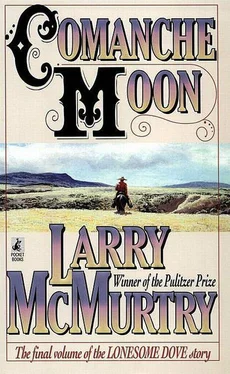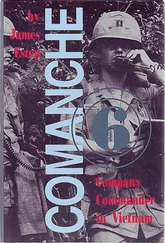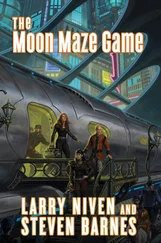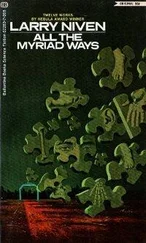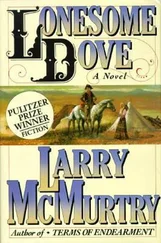Ahumado was not like Buffalo Hump--he didn't prance around in front of his enemies, taunting them. He hid and shot; he was only seen by his enemies once he had made them his prisoner.
As they walked their horses deeper and deeper into the Sierra Perdida, Call became more and more convinced that they were alone. From years of rangering in dangerous territory he had gained some confidence: he believed he could sense the presence of hostiles before he saw them. There would be a sense of threat that could not be traced to any one element of the situation: the horses might be nervous, the birds might be more noisy; or the threat might be detectable by the absence of normal sounds. Even if there was nothing specific to point to, he would tense a little, grow nervous, and rarely was his sense of alarm without basis. If he felt there was about to be a fight, usually there would be a fight.
Now, in the canyon that led to the cliff of caves, he felt no special apprehension.
Few landscapes were more threatening, physically-- Gus was right about the boulders being a good place for pistoleros to hide--but he didn't believe there were any pistoleros. The place felt empty, and he said so.
"He's gone," he said. "We've come too late, or else we've come to the wrong place." "It's the place we came to before, Woodrow," Augustus said. "I remember that sharp peak to the south. This is the same place." "I know that," Call agreed, "but I don't think anybody's here." "Why would they leave?" Gus asked. "They'd be pretty hard to attack, in these rocks." Call didn't answer--he felt perplexed.
They were only a few miles from the place where they expected to find the Captain, but they had heard nothing and seen nothing to indicate that anyone was there.
"Maybe we came all this way for nothing," he said.
"Maybe," Gus said. "We've had a lot of practice, going on expeditions for nothing.
That's how it's mostly turned out. You ride awhile in one direction and then you turn around and ride back." In the rocky terrain they had several times heard rattlesnakes sing, so many that Augustus had become reluctant to put his foot on the ground.
"We'll just get snakebit if we keep tramping on in the dark like this," he said. "Let's stop, Woodrow." "We might as well," Call agreed. "We can't be more than a mile or two from the place where the camp was. In the morning we can ride in and see what we see." "I hope I see a whore and a jug of tequila," Gus said. "Two whores wouldn't hurt, either. I'm so randy I might wear one of them down." Now that he didn't have to march through rattlesnakes, Augustus felt a little more relaxed. He immediately took off his boots and shook them out.
"What was in your boots?" Call inquired.
"Just my feet, but I like to shake my boots out regular," Gus said.
"Why?" "Scorpions," Gus replied. "They crawl around everywhere, down here in Mexico. One could sneak off a rock and go right in my boot.
They say if a Mexican scorpion bites you on your foot it will rot all your toes off." They hobbled the horses and kept them close by. There was no question of a fire, but they had a few scraps of cold venison in their saddlebags and ate that.
"Why would he ask for a thousand cattle if he was planning to leave?" Call asked.
"Maybe he didn't," Gus suggested. "That vaquero who showed up in Austin might have been lying, hoping to get a thousand free cattle for himself. I expect he just wanted to start a ranch." "If so, he was a bold vaquero," Call said. "He came right into Austin. We could have hung him." "The more scared I get, the more I feel like poking a whore," Augustus said.
"How scared are you?" Call asked.
"Not very, but I could still use a poke," Augustus said.
When he thought about the matter he realized that he had almost no apprehension, even though they were close to the Black Vaquero's camp.
"I know why I ain't scared, Woodrow," he said. "Long Bill ain't haunting us no more.
He was following along for a while but he's not here now." "Well, he never liked Mexico," Call observed. "Maybe that's why." "Either that or he just decided it was too far to travel," Augustus said.
It was after the old crippled woman began to bring him food that Scull's mind slipped.
At first the food she brought him was only corn-- ears of young corn which she pitched down into the pit.
The kernels were only just forming on the corn, it was so young; but Scull ate it greedily, ripping off the husks and biting and sucking the young kernels for their milky juice. The cobs he threw in a pile. He had been so hungry he was about to eat the dead snakes; the corn and the cool water revived him; it was then, though, with his strength returning and his ankle not so sore, that he began to speak in Greek. He looked up at the old woman to thank her, to say "gracias," and instead reeled off a paragraph of Demosthenes that he had learned at the knee of his tutor, forty years ago. It was only later, in the night, when the pit was dark, that he realized what he had done.
At first his lapse amused him. It was a curious thing; he would have to discuss it with someone at Harvard, if he survived. He believed it was probably the eyelids. The sun, unobstructed, burned through forty years of memory and revealed, again, a boy sitting in a chilly room in Boston, a Greek grammar in his lap, while a tutor who looked not unlike Hickling Prescott put him through his verbs.
The next morning it happened again. He woke to the smell of tortillas cooking--then the old woman rolled up a handful and lowered them to him in the jug that she used to bring him water. Scull hopped up and began to quote Greek--one of Achilles' wild imprecations from the Iliad, he couldn't recall which book. The old woman did not seem startled or frightened by the strange ^ws coming from the filthy, almost naked man in the pit. She looked down at him calmly, as if it were a normal thing for a white man in a pit in the Mexican mountains to be spouting Greek hexameters.
The old woman didn't seem to care what language he spoke, English and Greek being equally unintelligible to her; but Scull cared.
It wasn't merely damage done by the sun that was causing him to slip suddenly into Greek; it was the Scull dementia, damage from the broken seed. His father, Evanswood Scull, intermittently mad but a brilliant linguist, used to stomp into the nursery, thundering out passages in Latin, Greek, Icelandic, and Old Law French, a language which it was said that he was the only man in America to have a thorough mastery of.
Now the aberration of the father had reappeared in the son, and at a most inconvenient time. In the night he suddenly woke up twitching in the brain and poured out long speeches from the Greek orators, speeches he had never been able to remember as a boy, an ineptness that caused him to be put back a form in the Boston Latin School. Yet those same speeches had been, all along, imprinted in his memory as if on a tablet--he had merely to look up at the old woman to ask for water to pour out, instead, a speech to the citizens of Athens on some issue of civic policy. He couldn't choke off these orations, either; his tongue and his lungs worked on, in defiance of his brain.
Scull began to try and curb himself; he needed to devise a way to get out of the pit before Ahumado came back, or, if not Ahumado, some other pistolero who would shoot him for sport. His tongue might soar with the great Greek syllables, but even that noble language wasn't going to raise him fifteen feet, to the pit's edge. He thought he might encourage the old woman to look around--maybe someone had left a length of rope somewhere. If she could find a rope and anchor it somehow, he felt sure he could pull himself up.
He was handicapped, though, by the insistent Scull malady. When he saw her old face above him he would try to make a polite request in Spanish, of which he knew a sufficiency, but before he could utter a single phrase in Spanish the Greek would come pouring out, a cascade, a flood, surging out of him like a well erupting, a torrent of Greek that he couldn't check or slow.
Читать дальше
